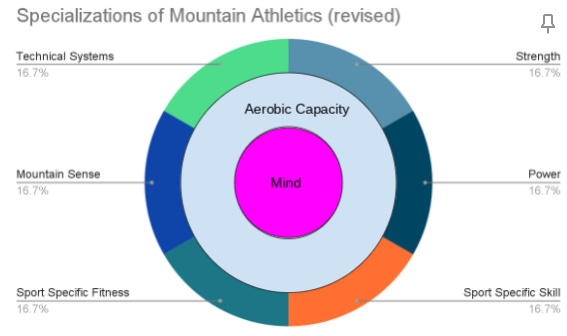An Integral Approach to Mountain Athletics
How does one approach training for the mountain environment? There are so many avenues to delve into, so many training habits or technical skills, what we eat, what we don't, how many seconds to hang on a board with so much weight, do I do max hangs, how about repeaters?
In essence, the conversation is overwhelming. It's muddled. In every way that we try to improve, we will naturally silo something else. We will leave something integral behind. Words like training specificity come to mind. Do X and you'll climb Y. All of this talk, this specialization is of course necessary for improvement. If it wasn't for endurance coaches we wouldn't know what we do about the Aerobic Base and how to build it. Without strength coaches, we wouldn't have the ability to devise ways to build power or strength. We also only have so many hours in the day, so much capacity to train, and so much time in our lives to devote to something as esoteric as mountain endeavors.
I say all this to preface our endeavor. There are no shortcuts in this path, only deeper rabbit holes to discover. All aspects of your person are integral to the pursuit of mountain athletics. And this as you might have guessed is where we shall start. To follow me down this new, integral approach, there are a couple of premises that I must now postulate;
All endeavors (objectives/goals/routes) exist within their own context. Knowledge of said context (desired goal or objective) will illuminate which area(s) of specialization or improvement are required for success.
All aspects of the individual (there are 8, that I will get into below) impact all others both ecologically as well as hierarchically.
The order of hierarchy or ecology depends entirely on the context of the situation in which we are training for.
Improvements can not be made across all spectrums at the same time, specialization is required.
Each individual is unique. Although most training protocols are generalized it is essential to understand that each person has their own, genetics, intersectionalities, likes-dislikes, skills, and abilities.
Let's speak for just a moment on each of the 8 spheres of specialization for which we can improve, and on which all mountain endeavors (bouldering, alpinism, trail running, etc) rely to some degree or another on. Below you will see an image of all areas of specialization from an ecological perspective of all being equal. This is of course just a hypothetical example, but an example of either a context-based requirement of these skills or an individual who is perfectly balanced in all categories.
Let's now dive into each of these categories for a little idea as to what they are/entail. This is by no means an exhaustive list of examples but enough for you to get an idea of what it means and understand a few specialties, which I will leave to the end. These again are not listed in order of importance but rather arbitrarily. Importance is determined by the context of the endeavor or the needs of the individual.
Technical Systems: Knowledge about the systems in which the particular sport or activity exists. Many times known as "hard skills". The ability to build an anchor, perform a burial rescue in an avalanche, or repair a ski binding in the field.
Mountain Sense: The understanding of the mountain environment, its complexities, and the ability to navigate within the said environment without the aid of technology. To push ahead in a certain situation or to turn around. This encompasses the entirety of the context in which technical systems are applied.
Strength: The total capacity to overcome resistance. Think more generally in the sense of say a one-rep max. Could also be thought of as the ceiling to which you could not produce more effort.
Power: The ability to produce force over time or the ability to overcome resistance in the shortest amount of time possible. The quicker movement/ability the higher the power.
Sport-Specific Skill: Knowledge acquired and or required by the sport. Referring to skill vs physicality. For example, cramponing on 40-degree ice, heel or toe hooking, or the act of skinning.
Sport-Specific Fitness: The ability to produce strength, force, or output specific to the endeavor. e.x. 7mm hangs, 75lb pack over mountainness terrain, etc.
Aerobic Fitness*: The cardiac/aerobic capacity of the central system. How much time one is able to produce continued work for, the ability to recover under stress, overall ability to move in any discipline without redlining the cardiac system.
Mind*: In its simplest form the ability to maintain focus or remain undistracted. Endless complexity in this area that we will delve into at a later date.
Now that we have a general idea of the categories of specialization in mountain athletics let me emphasize some areas that are slightly unique or at least seem to be as of now. I asterisked both Mind and Aerobic Fitness because they are in a sense somewhat more hierarchical than all of the other areas. Meaning that they impact every other area more directly and to some extent more entirely than any of the other 6.
To put it another way, no matter the endeavor, goal, or objective the context to which they occur relies on the ability of your heart and lungs to deliver oxygen to the muscles being used and for your mind to be able to think, perform, and execute the action.
Let's look at the previous graph in a slightly different way.
Keep reading with a 7-day free trial
Subscribe to Mountain Talk to keep reading this post and get 7 days of free access to the full post archives.



